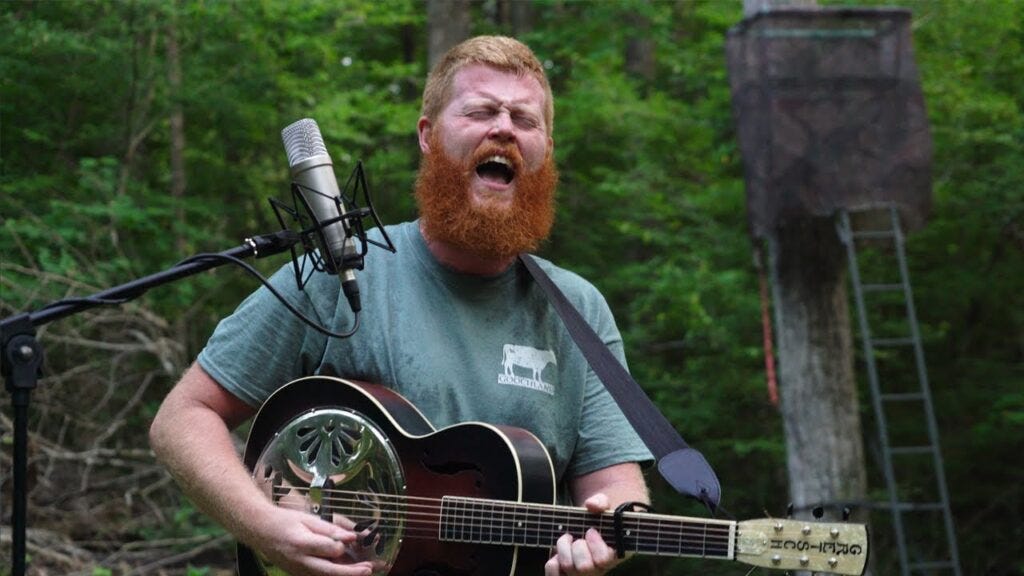Welcome to The Square Inch, a Friday newsletter on Christianity, culture, and all of the many-varied “square inches” of God’s domain. This is a paid subscription feature with a preview for free subscribers, so please click on the button below to enjoy this along with an “Off The Shelf” feature about books and Wednesday’s “The Quarter Inch,” a quick(er) commentary on current events.
Dear Friends,
The Internet has been in a tizzy recently over a viral song written by a Virginia bluegrass musician performing under the pseudonym Oliver Anthony. It’s called “Rich Men North of Richmond.” You might think of it as a second helping or second installment of rural populist anger, as it follows so quickly on the heels of Jason Aldean’s controversial “Try That in a Small Town.” In both cases, progressives clutch their pearls and head for the fainting couch, viewing such songs as expressive of racism (white supremacy) or patriarchy or whatever other bogeymen they project upon the subject matter. And, on the other hand, folks on the political right cheer and rejoice that someone is finally speaking truth to power or something. Tapping in to the “working man’s” frustrations is now a permanent feature of our civic life. Whether it makes sense is beside the point. It is lucrative business.
I have strong opinions about songs and songwriting (you should ask my bandmates). You might recall that I had little good to say about Mr. Aldean’s ridiculously lazy lyrics, and I’m sorry to say that I have similar feelings about Mr. Anthony’s latest offering. I don’t begrudge anyone for enjoying a stripped-down acoustic Appalachian bluegrass tune, even if it is unoriginal and pedestrian (read: boring), or even for enjoying the very over-wrought (read: fake) emotional anguish in the vocal performance. Look: Chris Stapleton sounds like Chris Stapleton. Oliver Anthony sounds like someone trying to sound like Chris Stapleton. And there is only one Chris Stapleton. I don’t enjoy Anthony’s vocal performance at all, but I guess I understand if others might.
What I do wonder, however, is how we came to the place and time in which self-styled American conservatives cheer a song chock-full of self-pity, victimhood, class grievance, and envy. There is not a dime’s worth of difference thematically between this song and some of Woody Guthrie or Pete Seeger’s Marxist rants about “The Man” keeping good folks down. The difference is that the political right is now embracing it. Because they embrace anything the “other side” hates, no matter what. In fact, if you criticize this song—and boy am I about to do that—you apparently get a slew of vitriol sent your way. Feel free. You might follow the NETTR principle, but I don’t. People don’t get a pass because they’re outwardly on the right team.
Mr. Anthony claims that his song went viral (#1 on iTunes currently) because of its “authenticity” and “honest lyrics.” Well, maybe it is authentic and honest, but I do have my doubts. Here’s something he had to say about his experience:
“Things were not good for a lot of people and in some respects I was one of those people,” Anthony said. “I had wasted a lot of nights getting high and getting drunk and I had sort of gotten to a point in my life where even things that I did care about didn’t mean anything to me anymore. This is certainly no Dr. Phil episode, but I found an outlet in this music. I started uploading a couple of songs.”
So Oliver Anthony wants to “be a voice” for the downtrodden working class to which he claims to belong. And the blame for it all—the drug addictions of which he speaks and spiking suicide rates—goes to … other people. Rich people, in fact. More specifically, rich men “north of Richmond,” which I presume is a reference to Washington, D.C. It is “rich men north of Richmond” who made Oliver Anthony “waste a lot of nights getting high and getting drunk” and to not care about anything. Anthony likes to use the word “bulls-t” in his song. It’s a good epithet for the song itself.
It is Exhibit A of what David Bahnsen has memorably called our Crisis of Responsibility. And I beg any young person attracted to this song to please go read the last chapter of that book and take it to heart. It just might save your life.
Without further adieu, allow me to provide some commentary on these lyrics.
Keep reading with a 7-day free trial
Subscribe to The Square Inch to keep reading this post and get 7 days of free access to the full post archives.





